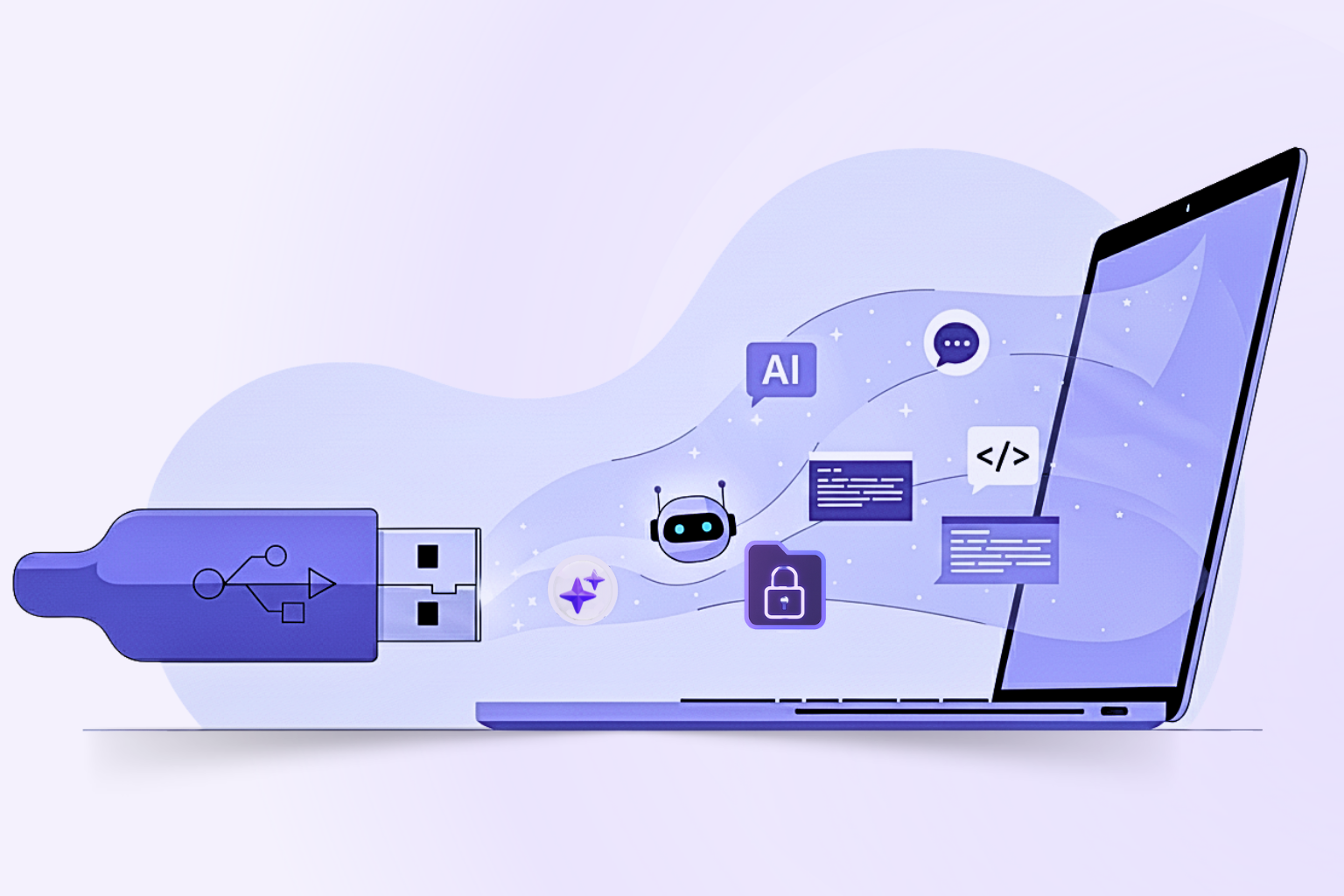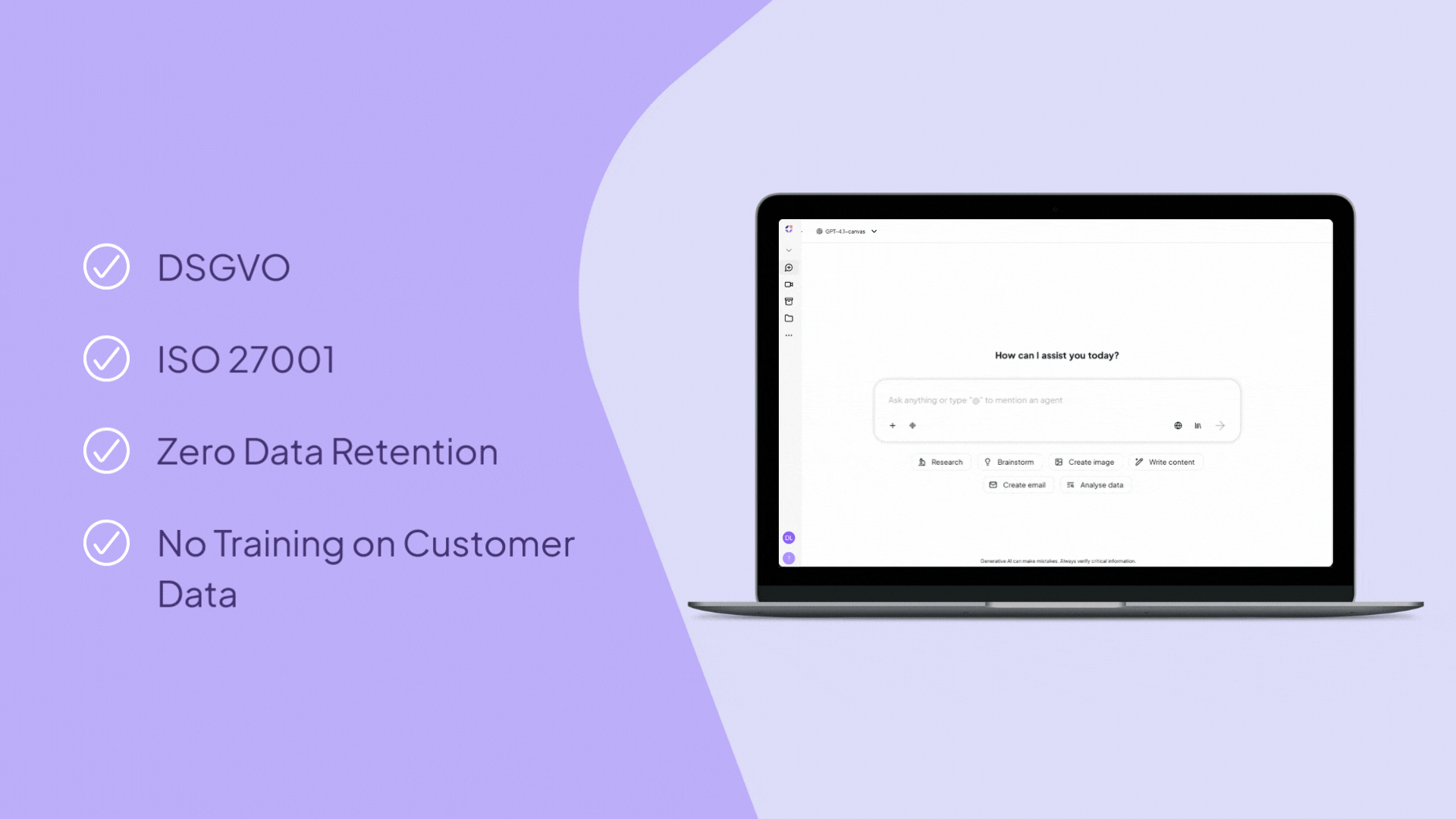Shadow AI: The Invisible Threat in Companies – and How to Stop It

Shadow AI is widespread: more than 54% of knowledge workers use unauthorized AI tools, often with private accounts.
👉 The solution: transparency, clear governance, and a secure platform like nuwacom make Shadow AI unnecessary.
Remember the days of USB sticks?
What is Shadow AI?
Typical patterns include:
- Employees entering texts or internal documents into publicly available tools.
- No central control or governance in place.
- Data leaving secure company IT and ending up on external servers.
👉 The result: a massive security and compliance risk.
The Reality: Shadow AI is No Niche Issue
- 54% of knowledge workers use unauthorized AI tools, and 49% wouldn’t give up their private tools even if banned.
(Software AG, 2024) - In 34% of companies, employees use private AI accounts outside corporate IT. Only 15% of these companies have clear AI usage policies.
(Bitkom, Nov 2024) - According to KPMG, less than half of companies have policies for generative AI. Many employees admit to passing off AI-generated content as their own work.
(KPMG Global AI Trust Study 2025) - Even the German Economic Institute warns: AI often “sneaks in through the back door”—a classic Shadow IT pattern.
(IW Report 33/2025)
Bottom line: Shadow AI isn’t an exception. It’s already the norm. Many companies have lost control—without even realizing it.
Why Even Mainstream AI Providers Are a Risk
Many companies assume: “If we officially use ChatGPT, Gemini, or Claude, we’re safe.”
Unfortunately, that’s not true. Mainstream AI tools come with serious risks:
1. Data used for model training
- Providers like OpenAI (ChatGPT), Anthropic (Claude), or Google (Gemini) reserve the right to use user data for training—unless you explicitly opt out.
- Even with training disabled, sensitive data still passes through external systems and logs.
2. U.S. servers and the CLOUD Act
- Most AI models are hosted or processed in the U.S.
- Under the CLOUD Act, U.S. authorities can demand access to data—even if it’s technically stored in the EU.
- In 2024, Microsoft admitted in court that it cannot guarantee Copilot data won’t be processed on U.S. servers.
3. Lack of GDPR and AI Act compliance
- Many tools aren’t fully GDPR-compliant.
- Auditability, traceability, and data sovereignty are limited—a dealbreaker for regulated industries.
4. No company context
- Even when employees use ChatGPT & Co. productively, these tools lack access to internal systems, documents, and processes.
- The result: more shadow solutions, as employees try to get work done more efficiently.
The Risks for Companies
- Data leaks & compliance violations → Sensitive information can end up in the wrong hands—often unintentionally.
- Reputation damage → A single leak can cost millions and destroy trust with customers and partners.
- Loss of knowledge → Without a central platform, knowledge silos and inefficient workflows emerge.
- Employee frustration & chaos → Bans don’t work—employees will always find ways to be productive.
Why Bans Fail
- 49% of employees say they’d keep using private tools even if forbidden.
- Employees aren’t acting maliciously—they just want to be productive.
- Without an attractive company-approved solution, uncontrolled Shadow AI use will continue.
The Solution: Visibility, Governance & Secure Platforms
Companies need a proactive strategy to eliminate Shadow AI:
Make Shadow AI visible: Use monitoring and open discussions to understand how AI is already being used.
Clear policies & training: Empower employees instead of blocking them. Policies should be practical and easy to understand.
Offer a secure alternative: Provide a platform that’s as easy as ChatGPT—but GDPR-compliant and safe.
How nuwacom Protects Businesses
With nuwacom, you get a central, secure AI platform:
- 100% GDPR-compliant, hosted in the EU (Azure Frankfurt, Private Cloud, or On-Prem).
- ISO 27001 and SOC2-certified data centers.
- No use of your data for training.
- Model-agnostic: access to the most powerful models.
- Seamless integration with 200+ systems (M365, Confluence, Slack, CRM, and more).
- Governance and rights management for compliance and works councils.
- Simple to use for all employees—no shadow tools needed.

Conclusion: Shadow AI is Already Here – Act Now
Shadow AI isn’t a hypothetical risk. It’s already embedded in companies and growing on the daily.
The mix of freely available tools, missing guidelines, and U.S.-hosted services makes the risk enormous.
🔑 The key isn’t banning, but transparency and control:
- Make Shadow AI visible
- Establish clear guidelines
- Introduce a secure platform
With nuwacom, you give employees a modern, safe, and productive solution that makes Shadow AI obsolete.
FAQ
1. What is Shadow AI?
2. Why is Shadow AI more dangerous than traditional Shadow IT?
Because AI tools often process sensitive corporate data and store it externally. Many providers use inputs for model training. Plus, U.S. hosting brings extra risks under the CLOUD Act.
3. Are tools like ChatGPT and Gemini GDPR-compliant?
4. Why don’t bans work against Shadow AI?
5. How can companies effectively stop Shadow AI?
By:
- Making usage visible and analyzing it
- Introducing clear policies and training
- Providing a central, secure platform like nuwacom that makes shadow solutions unnecessary
🔍 How deeply is Shadow AI embedded in your organization? Take our AI maturity test, a quick Shadow-AI check that reveals your current risks and offers actionable steps to regain control, ensure data sovereignty, and maintain compliance in just a few minutes!
Follow us on LinkedIn